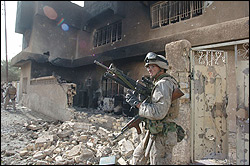Last year at Thanksgiving, candidate/President George W. Bush scored a PR coup by making a surprise, unannounced visit to troops in Baghdad for dinner. This year, had he tried the same stunt, he would have had to be protected in an Iraq that, thanks to his ill-advised policies, teeters on the brink of civil war. If such a war comes to pass, the recent Fallujah offensive will mark a significant turning point, a point at which ordinary Iraqis divested themselves of any last remaining tolerance for Americans.
Put simply: Iraqi anger over the flattening of Fallujah and the creation of a refugee population of the survivors among its 300,000 residents not only threatens the January election, it has turned virtually every corner of Iraq into an insurgent hotbed.
Here is a partial list of the cities in Iraq where massive fighting continues between U.S. forces and insurgents: Afar, Hilla, Mawaheel, Suwaira, Hit, Iskandariyah, Haditha, Latifiyah, Khaldiyah, and several neighborhoods in Baghdad, including al-Dora, al-Amiriyah, Abu Ghraib, al- Adhamiya, Hur Rajab, al-Abidi, Salman Bak, and Khan Dhari. The holy Shiite city of Karbala has also seen a lot of fighting. The guerrillas recently blew up four oil wells near Kirkuk and a pipeline that links the northern oil fields to the country’s largest refinery at Baiji.
Iraqi angst is so pronounced that on Nov. 18, leaders of the interim Iraqi government held a summit in the Kurdish north to discuss how to structure the election in January. Instead of discussing the topics on the agenda, the Iraqi ministers and council members ended up calling for a delay in the election for security reasons. Subsequently, a wide array of Sunni and Shiite parties came out last week in favor of postponing the election. They have acknowledged what the Bush administration has been denying: Almost every major Sunni political faction has announced a boycott of the election, meaning, under the political system we’ve devised for Iraq, they won’t be represented as the new government draws up what is hoped will be a permanent constitution. That’s a recipe for civil war: two competing groups, each claiming the same territory.
Alas, this isn’t on the radar as the Bush administration continues to churn out rosy assessments of the coming election. U.S. media have largely followed suit.
The targeting of Fallujah began last spring; all summer and fall, the military had been dropping bombs on the city. But nothing prepared its residents for the recent offensive. The city, according to eyewitnesses, now resembles a moonscape in many former neighborhoods. Most of the refugees created by the inferno went to outlying towns: 102,000 to Amiriyah, 21,600 to Karma, 18,000 to Nieamiyah, about 15,000 to Saklawiya, and at least 12,000 to Habb-aniyah. An unknown number are sitting in makeshift camps on the southern and western outskirts of Fallujah.
They escaped the fighting but still are victims of the deteriorating security situation. Lack of clean drinking water is epidemic. Food, medicine, and shelter cannot be brought to the civilian population because the situation is too dangerous. Insurgent attacks against aid workers have driven nearly all of the major agencies out of the country: World Vision, CARE International, Doctors Without Borders, Oxfam.
Civilians who remained in Fallujah throughout the U.S. attack are in the worst situation. The Red Cross estimates that at least 800 civilians died in the U.S. assault, a low estimate based on interviews of refugees and residents still trapped in the city. These people have described U.S. use of cluster bombs and the spraying of white phosphorus, a banned chemical weapon that burns like napalm. Having survived shrapnel wounds, a week of starvation, several days without water, and the itchy trigger fingers of U.S. snipers, civilians are now emerging from their hiding places to find U.S. troops unable and unprepared to care for them.
Originally, U.S. officials estimated that it would take about $50 million in reconstruction aid to rebuild Fallujah. That estimate has already doubled and is likely to rise further—but it might be moot, because no reconstruction can take place, in Fallujah or anywhere else, until the fighting stops and security improves. The military can only secure an area when it puts bodies there; as soon as Americans step away, the insurgents regain control. There simply aren’t enough bodies to spread the width of Iraq.
Conservatives in the Pentagon and White House have begun to whisper the previously unthinkable: that what is needed is a massive reduction of U.S. troops, that the U.S. presence itself is what is creating all the bloodshed. Unless they get the ear of President Bush, Iraq will continue to slide down the slippery path toward civil war.
Thanks to my Eat the State co-editor, Maria Tomchick, for assistance in reporting this column.







